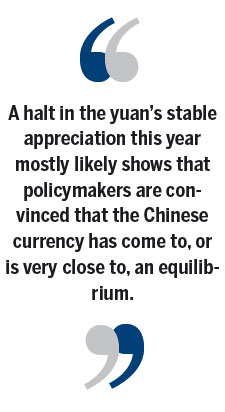The need for a stable yuan
Updated: 2014-11-14 10:41
By Luo Jiexin and Xue He(China Daily Europe)
|
|||||||||||
With the use of China's currency spreading globally, the yuan should hold its ground
The yuan is moving in two distinctive ways this year.
In terms of value, the currency's appreciation is no longer apparent. In the middle of November, the value of the Chinese currency against the US dollar remained lower than it was at the end of last year. It's very possible that the yuan will end the year with its value flat or slightly higher. This will represent the slowest pace of growth, if there is any, following the global financial crisis.
But in terms of fluctuation, the yuan has moved radically. Its sharp depreciation around February stunned the market, shattering the myth that the yuan always moves up. Since then, the yuan appreciated for several months before a marked depreciation in June. In daily trading, the yuan has also undergone a great deal of fluctuation.
These movements in the yuan are indicative of a few things. A halt in the yuan's stable appreciation this year mostly likely shows that policymakers are convinced that the Chinese currency has come to, or is very close to, an equilibrium. Over the past three years, China's current-account surplus has accounted for less than 3 percent of GDP, which could be even lower this year because China's trade surplus grew more slowly than the overall economy. Internationally, when the ratio is lower than 4 percent, the country's foreign exchange rate is believed to be balanced and reasonable. In this sense, China's yuan is not undervalued.

Entering the third quarter, China experienced capital outflows. Its capital and financial account had a deficit of $81.6 billion. With capital continuing to leave, normally a weaker yuan is needed to reverse the outflow.
China still needs some growth in exports to keep economic growth in a reasonable range. In the third quarter, net exports bolstered GDP growth. But since exports growth was achieved with a lower yuan, the central bank has less wiggle room to increase the value of the currency. Globally, the European Union and Japan have kept their currencies at low rates. As China follows the principle of pinning its foreign exchange rate to a basket of foreign currencies, the yuan has no reason to appreciate.
But there are two factors that create the need for a stronger yuan.
First, the rising US dollar. China looks at the greenback to decide the value of the yuan. Since the United States has pulled back from its quantitative easing policy and is expected to increase interest rates sometime next year, the US dollar will return to an upward trajectory. Because the yuan follows the dollar in curbing speculative funds, there will be appreciation pressures.
The other factor is the continued globalization of the yuan, which depends on a strong yuan value. Recently, China appointed a currency clearing bank in Canada, the first in North America. The country also established such a bank in Kuala Lumpur. In the near future, China will initiate a program that allows individual Hong Kong investors to use the yuan in investments on the mainland's stock market. Globalization of the yuan is obviously a major priority and the yuan should maintain its value to continue to be attractive.
As upward and downward pressures on the yuan offset each other, the best scenario is to keep the yuan's value stable and we believe the yuan's value will stay stable next year.
But the currency's short-term fluctuations will increase, with policymakers intending to create some volatility to punish speculators who bet on one-way, upward movement of the yuan. Depreciation will also become an integral part of the yuan.
The authors are financial analysts in Shanghai. The views do not necessarily reflect those of China Daily.
(China Daily European Weekly 11/14/2014 page11)
Today's Top News
Britain to introduce tough new foreign fighter laws
Russia expects relations with EU not to aggravate
Putin's tiger believed to be photographed in China
Lang Lang grabs German award
Road map for promoting the rule of law
China, US promise to reduce emissions
China urges all parties in Ukraine to truly implement Minsk deal
Nation's rapid Ebola response 'could prevent an outbreak'
Hot Topics
Lunar probe , China growth forecasts, Emission rules get tougher, China seen through 'colored lens', International board,
Editor's Picks

|

|

|

|

|

|





